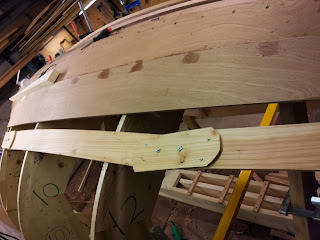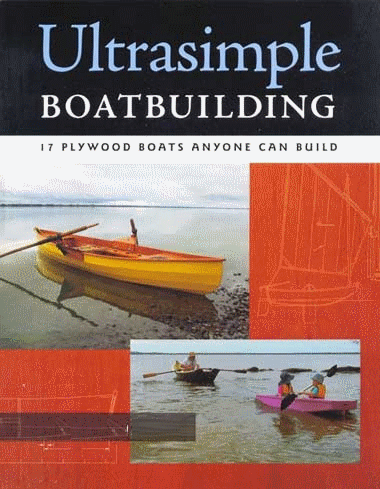Although I managed to get a reasonable result with spiling the garboards, the broad strake and next plank proved more difficult. I suspected a faulty spiling pattern (the bad carpenter always blames his tools, right?!!) so I recreated the spiling pattern using larch thicknessed to 8mm. It is articulated in three places and seems to maintain its position securely with several short self tapping screws.
However, I notice that the resulting planks turn out to have more of a curve in them than required. In other words the ends were pointing higher up towards the keel by some 2 to 3 inches than required.....
Having made a couple of expensive dud planks, I started using hardboard as a test plank and refined this until it fitted and then laid this on the planking stick to mark points for fairing the baton on. This produced accurate planks, but it is a slow multi step process, and I would really like to refine my compass spiling technique such that this intermediate stage can be eradicated.
Reading various forums on spiling, I really like the approach of tacking two batens onto the build lined us exactly to the upper and lower edges of the new plank and tacking a trellis network of light timbers between them to recreate the plank. The only drawback I see is how to get a smooth surface to run the circular saw armed with John Brook's special jig and subsequently the router on the batten. Maybe one has to nail the trellised batons onto the planking stock long the battens and then remove the trellis before cutting...
I used 10 second mitre glue to tack on the small pieces of hardbard - initially I was quite suspicious of this product which Brian had recommended - it looks like superglue with an aerosol can of catalyst hardener - but it worked miraculously - gluing extremely strongly in 10 seconds...I may use this on the trellis pattern approach instead of a pneumatic staple gun.
If anyone can pinpoint why my planks are turning out more curved than they should be, please comment...it may well be that this is a known repeated error of the first time amateur wooden boat builder...!
Read More..
However, I notice that the resulting planks turn out to have more of a curve in them than required. In other words the ends were pointing higher up towards the keel by some 2 to 3 inches than required.....
 |
| Here the spiling pattern is laid on top of the preceding planks bevel, about 1/2" away from the top edged of the bevel...time will tell if this approach solves the problem. |
Having made a couple of expensive dud planks, I started using hardboard as a test plank and refined this until it fitted and then laid this on the planking stick to mark points for fairing the baton on. This produced accurate planks, but it is a slow multi step process, and I would really like to refine my compass spiling technique such that this intermediate stage can be eradicated.
Reading various forums on spiling, I really like the approach of tacking two batens onto the build lined us exactly to the upper and lower edges of the new plank and tacking a trellis network of light timbers between them to recreate the plank. The only drawback I see is how to get a smooth surface to run the circular saw armed with John Brook's special jig and subsequently the router on the batten. Maybe one has to nail the trellised batons onto the planking stock long the battens and then remove the trellis before cutting...
I used 10 second mitre glue to tack on the small pieces of hardbard - initially I was quite suspicious of this product which Brian had recommended - it looks like superglue with an aerosol can of catalyst hardener - but it worked miraculously - gluing extremely strongly in 10 seconds...I may use this on the trellis pattern approach instead of a pneumatic staple gun.
I will try one more approach with my articulated spiling template and compass, as per John Brooks GLWB excellent book, but if the template which ensues turns out cursed as previous iterations, I will try the trellised approach and record updates in later posts.
If anyone can pinpoint why my planks are turning out more curved than they should be, please comment...it may well be that this is a known repeated error of the first time amateur wooden boat builder...!










































